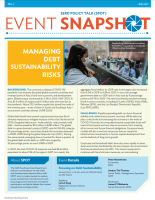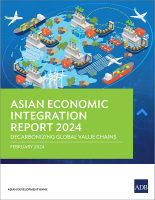
Countries in Southeast Asia are stepping up the rollout of 5G infrastructure to support the growth of the digital economy. Photo credit: iStock/Kinwun.
Foreign investments in the digital economy, including Industry 4.0 technologies, and infrastructure remain strong.
Foreign direct investment (FDI) flows into the ASEAN region fell by 25% to $137 billion from an all-time high of $182 billion in 2019 given the impact of the coronavirus disease (COVID-19) pandemic. Despite the decline, ASEAN remained an attractive investment destination, with its share of global FDI rising from 11.9% in 2019 to 13.7% in 2020, according to a report released on 8 September.
The ASEAN Investment Report 2020–2021: Investing in Industry 4.0 says foreign investments in the digital economy and infrastructure-related industries, including electricity, information and communication technology, and transportation and storage, remained strong despite the crisis.
The 10 ASEAN member states are Brunei Darussalam, Cambodia, Indonesia, Lao People’s Democratic Republic, Malaysia, Myanmar, the Philippines, Singapore, Thailand, and Viet Nam.
Drivers of FDI growth
The report expects the Regional Comprehensive Economic Partnership (RCEP) Agreement to further boost FDI and enhance economic integration in the economic bloc that constitutes about 15% of global FDI stock and more than 33% of global FDI flows in 2020. The RCEP, which is ASEAN’s biggest trade agreement, was signed in November 2020 amid the pandemic. It includes its five regional partners: Australia, the People’s Republic of China, Japan, Republic of Korea, and New Zealand.
This year’s investment report examines FDI’s role in ASEAN’s Industry 4.0 transformation and how member states are adopting related technologies to step up industrialization and economic development. Industry 4.0 refers to a range of new technologies that fuse the physical, digital, and biological worlds. It includes Internet of Things (IoT), artificial intelligence (AI), cloud computing, and cognitive computing. These technologies are expected to result in productivity gains for ASEAN that will increase the gross domestic product (GDP) annually by $0.6 trillion by 2025.
A study by the Asian Development Bank in selected industries show that the adoption of Industry 4.0 technologies can not only result in large potential returns to businesses but also create more jobs. Research also shows businesses that are skilled in these technologies are likely to recover faster from the pandemic and become more resilient.
“Foreign investors in ASEAN are playing an important catalytic role in the Industry 4.0 transformation process as users, technology providers, manufacturers, trainers, influencers of SMEs [small and medium-sized enterprises], and ecosystem enhancers,” the ASEAN report says.
In the meantime, ASEAN countries are upgrading their communication and digital infrastructure to support Industry 4.0 development. Upgrading telecommunication facilities, network, and equipment to 5G, the next generation wireless network technology, alone is estimated to require some $14 billion in investments per year until 2025.
Investments in data centers and cloud computing by multinational enterprises (MNEs) are expected to turn the region into a global data center hub. “Twelve of the 15 largest data center MNEs, which account for 50 per cent of the global market, and all but one of the top 15 global cloud MNEs are establishing and operating data centers in the region,” the report notes. The data center market in the region is expected to reach $3.5 billion by 2024 from $1.9 billion in 2019. Some 70% of the data centers in the region are in Singapore, Indonesia, and Malaysia.
Investments in automation and internet of things (IoT), particularly in manufacturing, are also increasing. The report says the world’s top 50 multinationals in industrial automation and major IoT players are in the region. Indonesia, Malaysia, the Philippines, Singapore, Thailand, and Viet Nam are major markets for IoT because of the development of smart cities, upgrades in manufacturing, and the growth in the digital economy.
Policy options
The report also provides policy options to attract FDI in supporting the region’s digital transformation, including in setting the right strategic direction and addressing the bottlenecks that impede the transformation. Policies include developing Industry 4.0 capacity and skills, putting in place the necessary regulation (i.e., cybersecurity, data privacy) while supporting innovation, and promoting sustainable digital development by shifting to clean energy. The report notes that data centers in particular are large consumers of electricity.
The ASEAN Investment Report is prepared under a technical cooperation agreement between the ASEAN Secretariat and the United Nations Conference on Trade and Development, with inputs from members of the ASEAN Coordinating Committee on Investment and supported by the ASEAN-Australia Development Cooperation Program Phase II.
This article was first published by BIMP-EAGA on 9 September 2021.

BIMP-EAGA
The Brunei Darussalam–Indonesia–Malaysia–Philippines East ASEAN Growth Area, or BIMP-EAGA, is a cooperation initiative established in 1994 to spur development in remote and less developed areas in the four participating Southeast Asian countries.


